From a small corner storefront in Bangkok, Suchart Prasomsu, 53, a rice dealer, leads a rescue team of 30 volunteers. They rush to car crashes or crime scenes. They also retrieve the bodies of those who died in their homes, and since the start of the pandemic, part of their job has become trying to prevent people from killing themselves.
Sacks of rice are stacked among disinfectant tanks (used to clean the apartment of a neighbor who contracted COVID-19), Prasomsu's rescue diving suit (for when someone has jumped into the river), a Buddhist shrine, a cage of songbirds and his poodle, Lion.
Parked outside is the motorcycle he uses to weave through Bangkok's traffic. His shortwave radios — one that picks up police reports in his riverside district and the other for the entire central region of Thailand — crackle in the background.
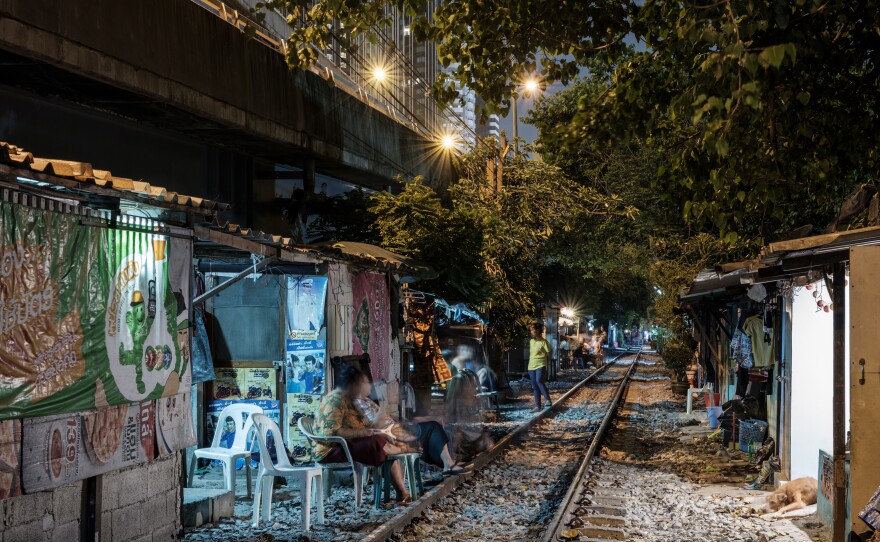
Prasomsu has been a rescue volunteer for nearly 30 years. He says the reports of suicide have ticked up since the country announced a lockdown on March 26 in the effort to stop the spread of the novel coronavirus.
He and his team have responded to at least 10 police reports of people who are publicly suicidal in his area. He talked to one young woman who nearly killed herself after losing her job at a factory.
He remembers her because she backed away from the edge.
Sometimes, he responds to a call and there's nothing left but a pair of flip-flops. It becomes a job for the divers to recover the body, Prasomsu said. "Then we can help by giving them a proper burial."
Coronavirus: success and tragedy
The case and death rates from COVID-19 in Thailand are among the world's lowest, with about 3,100 confirmed cases and 58 deaths, as of Thursday. Thai epidemiologists say their health care system — one of the finest in the world — had a major role to play. So did a strict lockdown.
Loading...
But like many other countries, the measures to contain the virus have also caused mass disruptions as the economy came to a sudden stop. Shops, offices, malls, markets, factories, gyms, restaurants and bars were ordered to close. Domestic and international flights were grounded. People were ordered to stay home, and if they went outside, they were required to wear a mask. The few businesses that stayed open, like grocery stores, were required to do temperature checks at the door and squirted alcohol hand sanitizer into the hands of their customers.
In May, the government began easing the restrictions, and as of mid-June, most businesses have been allowed to reopen.
Dr. Varoth Chotpitayasunondh, a psychiatrist and spokesperson for the mental health department of Thailand's Ministry of Public Health, says that now the threat of COVID-19 is under control, the government is faced with a different public health challenge: "The next wave of the problem will be mental health."
According to the World Health Organization's 2016 global report on mental health, with 14.4 suicides for every 100,000 people, Thailand has the highest suicide rate in Southeast Asia. (The global average is 10.6 per 100,000.)
The government disputes the WHO numbers, saying its data shows a baseline rate of 6 to 6.5 deaths by suicide per 100,000. What officials don't dispute is that the economic hardship brought by the pandemic and soaring unemployment will likely lead to a rise in suicides.
In April, Somsri Taenmok, 41, drifted into Thamniyom temple in Ayutthaya, a city an hour north of Bangkok, holding the hand of his 5-year-old daughter, Anna. He was a day laborer looking for work. For two days, he wandered through the city visiting construction sites, but projects had slowed down and no one needed an extra hand. At night, he and his daughter slept on a borrowed blanket under an awning in the temple parking lot. The caretaker, Swing Wajapairoh, 82, remembered him as a quiet man. His daughter, she said, was hip-high and talkative.
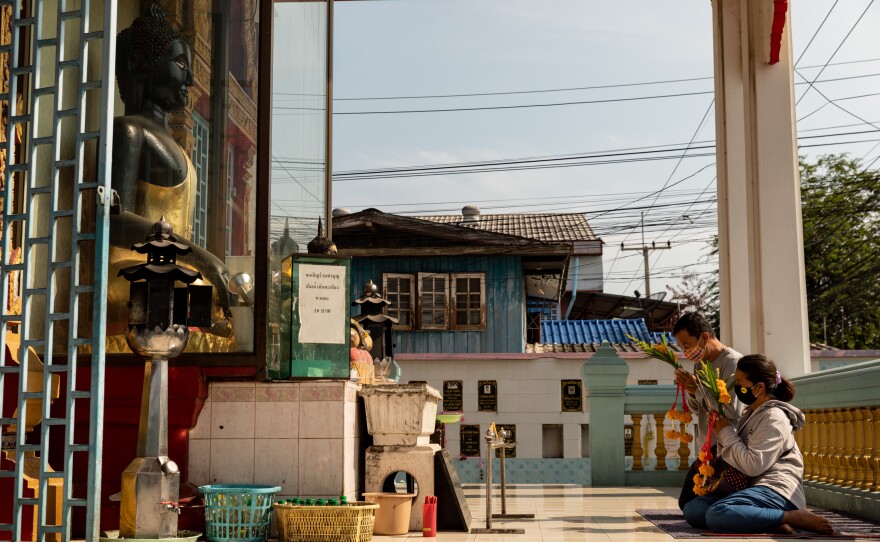
"Father don't leave me" was the last thing people nearby heard the girl say. Their bodies were recovered later that day. They were 200 miles from their home province of Maha Sarakham. While no one can say for sure what the reasons are for Taenmok's death, suicides like his, occurring amid the stresses of the economic downturn, have alarmed many, including the government.
A helping hand that doesn't help everyone
To offset the economic hardship from the lockdown, the government launched a financial aid program in March that disburses 5,000 baht, or $150, a month for three months to people whose incomes have been affected. Nearly 29 million Thais applied. After several expansions of the fund, by mid-May, about 16 million had started receiving the monthly stipend or were close to getting it.
But the delays and rejections have left some in desperation.
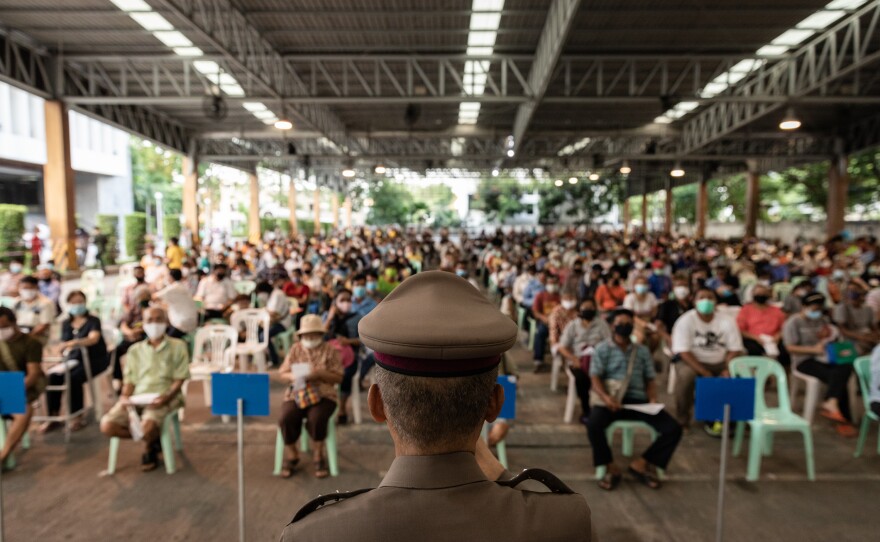
In April, a woman drank rat poison outside the Ministry of Finance to protest the long application process to receive the 5,000 baht aid. She survived. A man who picketed to protest outside the ministry died by suicide four days later.
Somchai Preechasilpakul, an associate professor of law at Chiang Mai University who researches the impact of government policies on the urban poor, criticized the government response for its slow disbursement – while some received the aid within a couple of weeks, others were left waiting for a month or more — and the uncertainty around who would qualify for the aid and who wouldn't.
While Preechasilpakul supports the lockdown and believes the country's economic recovery is predicated on the government's continued ability to contain the virus, he believes that a successful response should have included quick, effective measures to ease the financial strain the lockdown imposed on people.
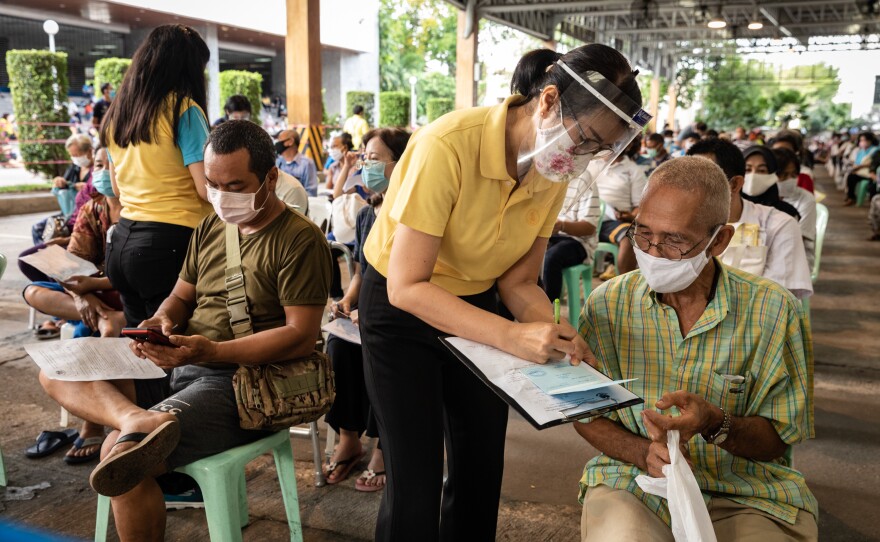
A system that automatically distributed the 5,000 baht aid to Thai workers (and allowed those who didn't need it to opt out), Preechasilpakul said, would have allowed more people to receive the aid more quickly. Instead, the existing system tangled millions in bureaucratic red tape, even as their bills piled up and some struggled to afford their next meals. Delays and rejections heaped stress upon uncertainty for Thailand's poorest.
He said the coronavirus response has not succeeded if people are dying by suicide. "It's a failure of the system," Preechasilpakul said.
Preechasilpakul is a part of research team that published a report at the end of April that found that of the more than 80 suicide attempts they reviewed in April, 44 were related to hardships caused by the economic lockdown.
The Thai government has since expanded its financial aid programs to include more people. On May 28, the prime minister acknowledged in a statement that the pandemic is an economic crisis as well as a health crisis.
Chotpitayasunondh, the government psychiatrist, studied the pattern of the 1997 Asian financial crisis to prepare the response for this one. A deep recession and crushing austerity resulted in a rise in suicides in Thailand back then — slowly at first, then peaking two years later in 1999 to 8.6 deaths by suicide per 100,000 and with rates remaining above the baseline average for five years after the impact. "That's quite a lot," he said, adding that the pandemic will be the biggest mental health challenge the department had faced since it was created.
'Informal workers' in distress
Studies from 2008's global financial crisis have correlated unemployment with a rise in suicides across regions around the world. A United Nations report published in May sounded the alarm on the need for action on the mental health impact of COVID -19.
"The mental health and well-being of whole societies have been severely impacted by this crisis and are a priority to be addressed urgently," Devora Kestel, director of the World Health Organization's mental health department, said in a May 14 press briefing to present the U.N. report. "The isolation, the fear, the uncertainty, the economic turmoil — they all cause or could cause psychological distress."
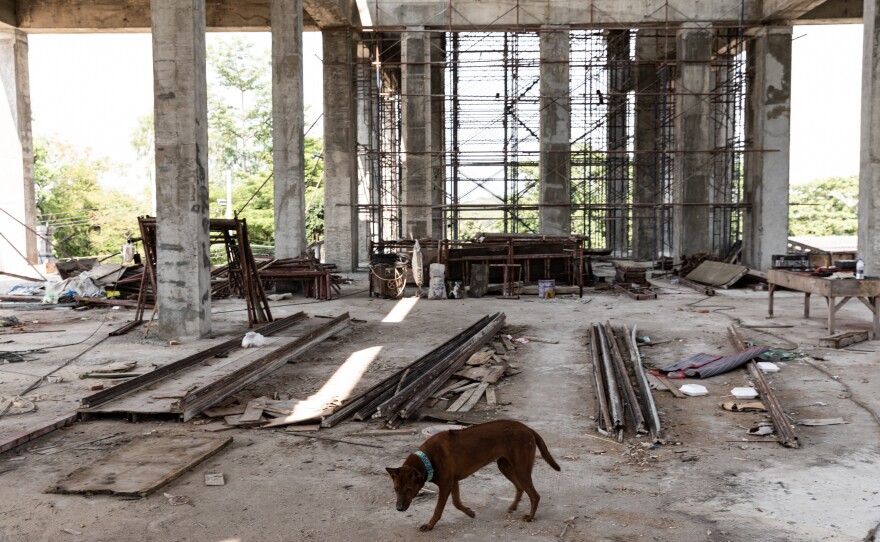
Around the world, the economic impact of the lockdown is unfolding, and the projections are staggering. The United Nations warned that a global recession will reverse a three-decade upward trend in living standards. The International Labor Organization estimates that the global lockdown will result in 195 million people unemployed around the world, millions more will be underemployed and an additional 1.6 billion informal workers will see their earnings reduced. These include street vendors, market sellers, domestic workers and informal repair shops in front yards — people who power significant economic sectors in developing countries.
In Thailand, many of the economy's most crucial sectors have been severely restricted by the lockdown. Construction sites, offices and massage parlors were shut down. Tourism, which makes up 20 percent of the national GDP, collapsed as international borders closed and airlines were grounded. Manufacturing makes up another 30 percent of GDP; factories were shuttered for the lockdown, and exports will struggle to rebound as global trade remains uncertain.
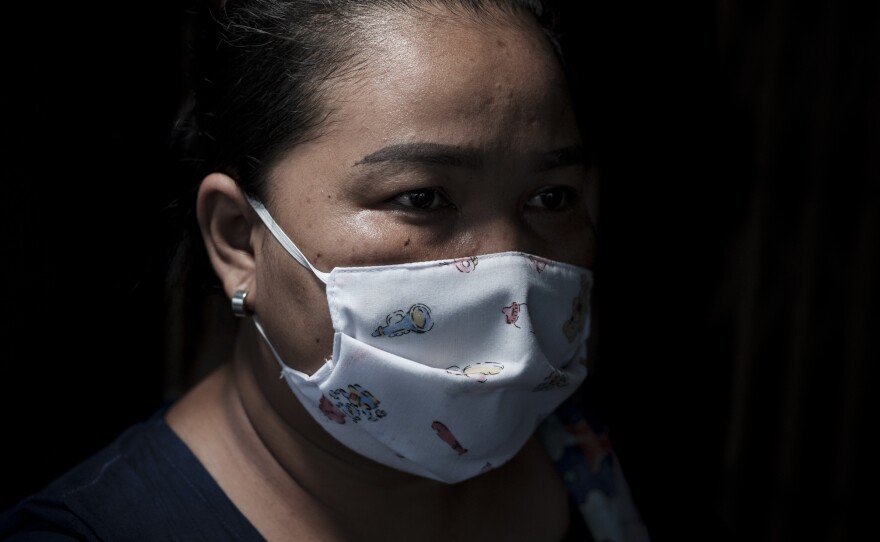
While suicide is an extreme outcome of the mental health challenges in the wake of the pandemic, stress, burnout, anxiety and depression exacerbated by the economic impact will affect millions more.
In Bangkok, an outdoor concrete lot in the Department of Public Relations, served as an improvised processing center for appeals and applications for the 5,000 baht aid, members of the city's working class lined up on May 8. Their temperatures were checked at the gate as a precaution. Everyone wore masks as required by law and were seated on plastic chairs spaced about 6 feet apart. Some arrived before dawn, hours before the offices opened, eager to be at the front of the day's line.
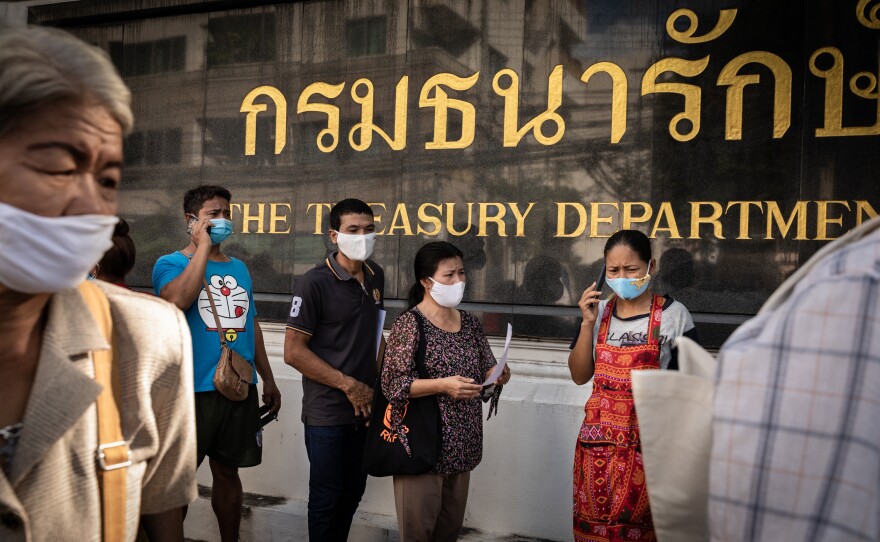
Apinya Thamniyon, 53, a taxi driver, sat, weary and hunched into his light blue uniform, his loose black trousers gathered around his waist. The day before, the landlord threatened his wife with eviction because they were two months behind on their rent. If he misses another payment on his taxi, that, too, will be taken away. With the city at a near standstill, he was making as little as 150 baht ($4.70) a day — far less than what he needed to cover gas, the taxi rental and basic expenses — and some days nothing at all. Before the lockdown, he could expect to make as much as 1,000 baht ($31) a day.
He found out that day that his application was canceled, with no explanation, and was told to reapply.
Pratung Dechraksa, 75, came to find out why her application had been denied. She was a roving street vendor, pushing a cart of fried bananas. With the lockdown, she no longer had anyone to sell them to. Her son, Tihtakarn Dechraksa, 50, who waited in line with her, used to be a security guard until he was laid off in early March. He has picked up some manual labor: In April, he earned $30 digging out a pond. But he hadn't worked since. They're living on edible ivy foraged from their neighborhood, whatever fish he can catch from the creek, and food purchased on credit at the local sundries shop.
Laddawan Pluemarom, 53, also came to find out why her application for aid was denied. After the factory near her house closed, her job as a laundry woman for the workers dried up. She followed a YouTube tutorial to learn how to make banana cakes to sell at a coffee shop. But soon that closed, too. She's down to one meal a day and spends her time scrolling through the news on her phone. She has seen the reports of suicides, but she doesn't linger on them. "It's too much to bear," she said.
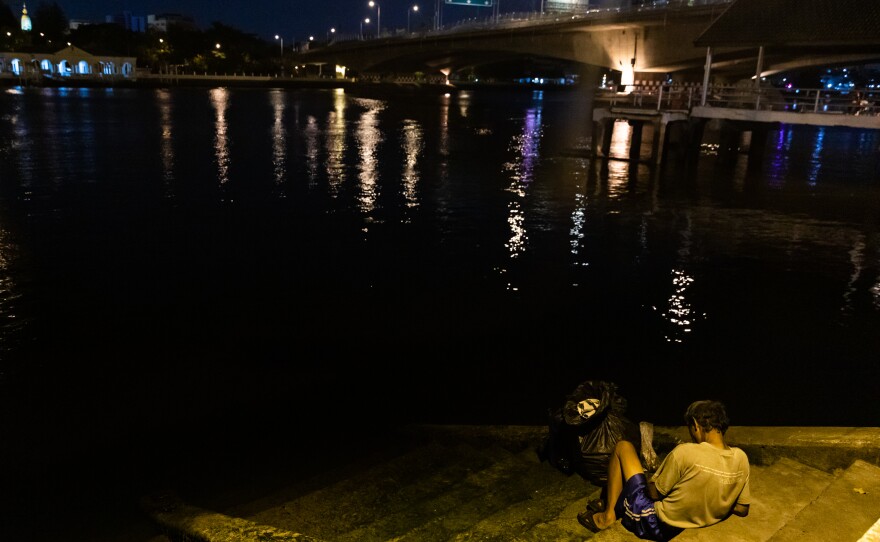
Thailand controlled the spread of coronavirus in part because of a vast network of over 1 million village health volunteers, who went door to door, checking temperatures, dispensing public health advisories and dispelling misinformation. At night, they sewed masks and, in the mornings, distributed them to their neighbors.
Now, says Varoth Chotpitayasunondh, of the mental health department, the same volunteers will get basic training to recognize stress, burnout and anxiety in their neighbors. If one of their neighbors is exhibiting signs of possible depression or dangerous suicide ideation, they will refer them to mental health nurses, social workers or the local psychiatrist, there's at least one in each of Thailand's provinces.
The mental health department launched a program in May to help Thai people navigate the mental health crisis. It includes a prevention plan it called the "mind vaccine," meant to provide guidelines for communities to build mental resilience and find ways to tailor activities to their community's challenges.
Effective approaches and activities, Chotpitayasunondh emphasized, will be different in each community in Thailand, but the program sends the message that the mental health crisis is real, and it should be faced head-on. While the pandemic diverted resources from chronic illnesses, including mental health, Chotpitayasunondh hopes that once the physical threat recedes, funding will be redirected to the mental health response.
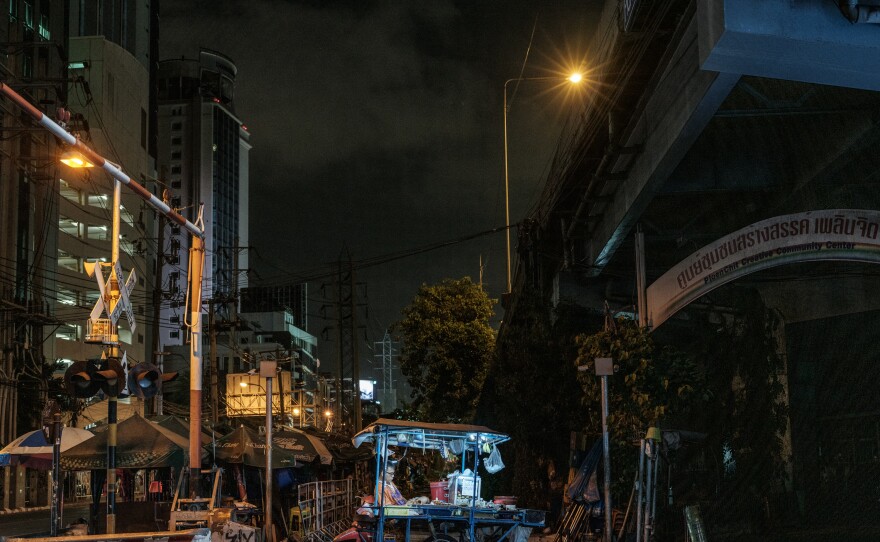
Chotpitayasunondh described the concept of the mental health "mind vaccine" in three parts: an individual vaccine, a family vaccine and a community vaccine, which the mental health department adapted to the Thai context from international psychological first aid practices. To build self-esteem and a sense of control for individuals, Chotpitayasunondh suggested that a village can assign unemployed workers volunteer jobs in the community as a way to give them a sense of purpose at an uncertain time.
Families could adjust their roles to share the burdens brought on by the pandemic's period of disruption. If a provider lost his or her job, another member of the family might take on entrepreneurial work, selling cooked food at the newly opened markets, for example. Communities can foster a sense of safety and calm with measured, transparent information about COVID-19, and disseminate tips on how to deal with stress and anxiety. Village wise men and leaders are encouraged to rally their neighborhoods together to help each other.
What you can and can't control
"Connectedness, this is something that we can control," Chotpitayasunondh said. "You cannot control the pandemic, you cannot control the infection rate, you cannot control the economy. What you can control is yourself, your family and your community."
Public food cabinets are being installed by volunteers across Thailand. Those with money to spare pool their resources to fill the cabinets with oil, rice, bottled water and fresh eggs. Those in need can collect the food. It's on an honor system, so no one checks up on those who come.
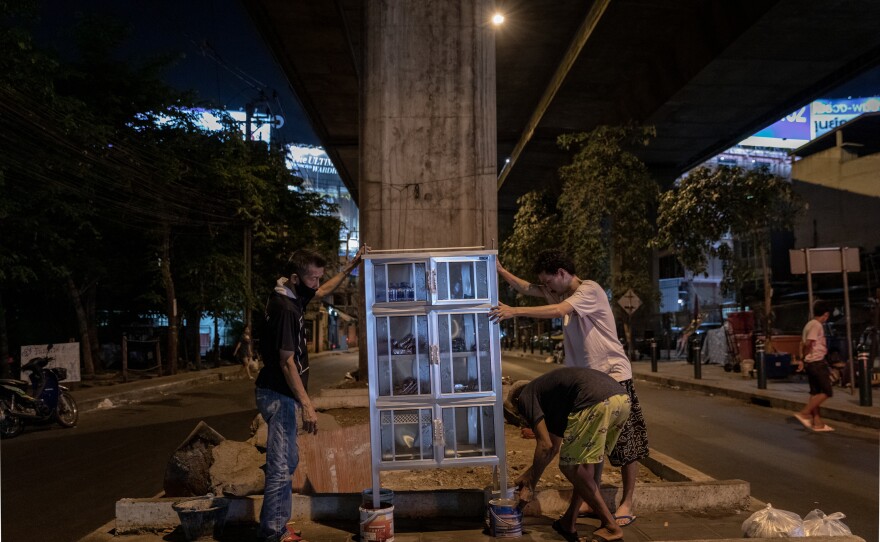
On a recent Saturday in Ratchaburi, a province two hours west of Bangkok, a freshly filled street-side cabinet was emptied in minutes by motorcycle taxi drivers, out-of-work street vendors and others. Some of them hadn't received their 5,000 baht aid; others had, but ran it down paying back debts.
If there's anything Chotpitayasunondh wants to convey about suicide, it's that it is complex and that no one factor leads to a death by suicide. Simplifying the reasons why a person may have died by suicide obscures the opportunities for prevention. If one thing is broken, you can support the other parts of a person's life. There are protective factors, that can be used to push back on suicidal impulses, he said, and gave the example of a supportive family.
In May, Samart Thermuangpak, 42, a construction worker, tried to kill himself. His wife, Pranee Thermuangpak, 38, said he had a history of depression and self-medicated with alcohol. She is epileptic and unable to work, and her aging mother needed regular medication. After the construction jobs dried up in the lockdown and the 5,000 baht aid didn't arrive, the pressures became too much for Samart.
Their three children, aged 8, 14 and 16, wept and begged him not to kill himself. They asked him how they would live if he died. He changed his mind after the police commander offered to give him the 5,000 baht he needed to help his family, from his own pocket.
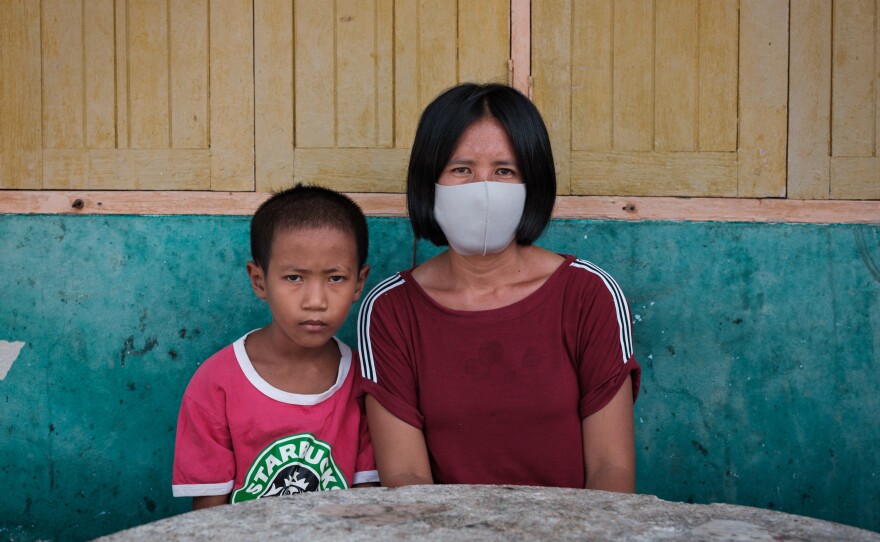
On a recent Saturday, Samart sat on a mat in their one-room home. Since that day in May, Samart has nearly killed himself three other times. The village doctor told Pranee and her children to keep a close eye on him. They do not leave his side.
And the community has rallied around the family to support them. Their neighbors drop by, asking them about his well-being, their landlord told them they didn't need to pay rent. The day of her husband's most recent close call, district leaders and a health volunteer came to see him, to calm him down, acknowledge that he's suffering and reassure him that he's being taken care of. They took him to see the police commander, whom Pranee said her husband trusted. The commander assigned one of his officers to check in on Samart once a day and gave the family his personal number so they can call him if they need his help.
Pranee tells Samart the two things she knows to be true: that his family loves him and it will get better one day.
Aurora Almendral is an American journalist based in Southeast Asia with an interest in politics, climate change, migration and economics. Her work has been recognized with multiple awards, including from the Overseas Press Club of America and a regional Edward R. Murrow Award.
Photographer Patrick Brown has been based in Bangkok for the last 2 decades covering stories in and around the region. He now splits his time between Bangkok and Copenhagen. In 2019, he published No Place On Earth, documenting the lives of Rohingya refugees.
Copyright 2023 NPR. To see more, visit https://www.npr.org. 9(MDAzMjM2NDYzMDEyMzc1Njk5NjAxNzY3OQ001))






